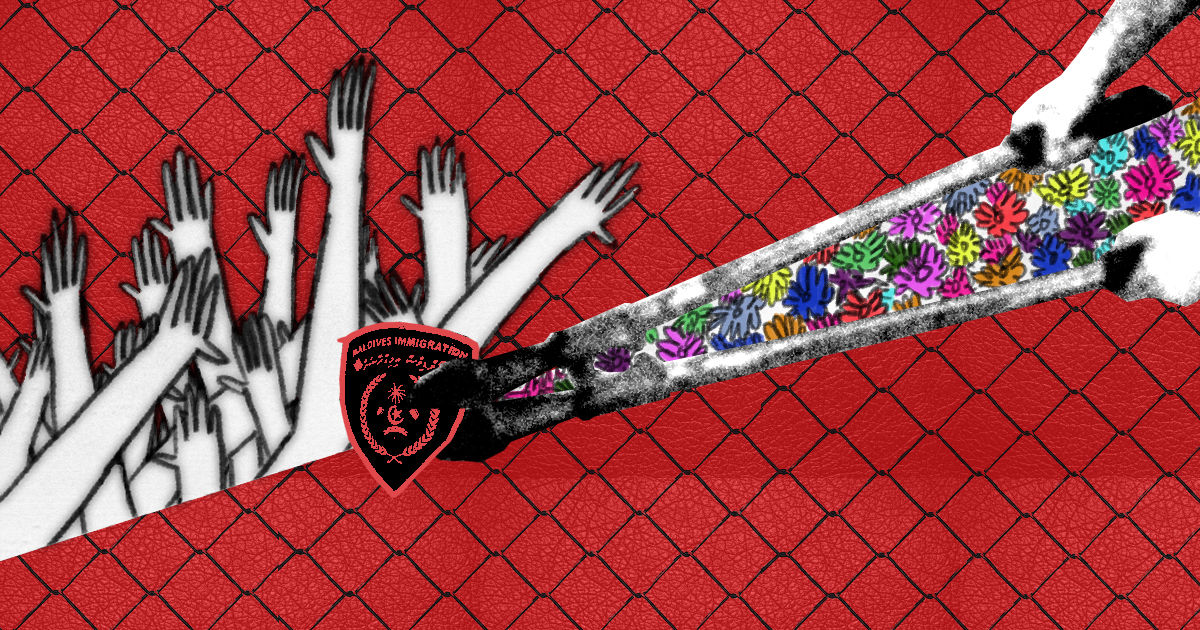“No one came illegally”: migrant extortion scandal exposes systemic failures
The Bangladesh High Commissioner called for reforms to address root causes.

Artwork: Dosain
26 Mar 2025, 23:34
Shocking revelations of a migrant worker extortion scheme overseen by the head of immigration have revived longstanding concerns about bribery, exploitation and human trafficking – deep-rooted systemic failures that stem from employer abuses and flawed visa processes, according to the Bangladeshi envoy.
The arrest of sacked immigration controller general Mohamed Shamaan Waheed on Friday over an alleged MVR 530,000 (US$ 34,370) kickback to release a detained migrant worker came amid a crackdown with regular inspections, raids and deportations over the past year.
But the abuse of authority from the head of a law enforcement body with powers to detain undocumented workers – a vulnerable group that faces barriers in accessing legal counsel – has called into question the fairness and effectiveness of the aggressive enforcement-centred approach.
“No one came here illegally. Everyone came here with proper documents, but over the period of time, many issues actually, they became undocumented,” Md Sohel Parvez, counsellor and acting High Commissioner of Bangladesh, told the Maldives Independent.
“We discussed with the [homeland security] ministry, we should find out the root cause, otherwise if we catch them and deport them, it will not solve the problem. That’s the understanding of our [diplomatic] mission. We have to find out why they became irregular or undocumented.”
Cash for freedom
According to the police, three immigration officers acting on the orders of then-Controller General Shamaan raided an expatriate residence, detained a migrant worker with a large amount of cash and released him a day later.
Later that night, the same officers – who were not members of the sections that typically locate and detain undocumented migrants – “met with the released foreign national on the street, obtained money from him, and then entered [Shamaan’s apartment].” The police seized the MVR 530,000 in cash in a search that preceded the controller general’s dismissal and arrest.
The suspected extortion raised questions about the scale and frequency of such abuses.
A lawyer involved with pro bono representation of migrant workers told the Maldives Independent about requesting to visit the immigration detention centre in Hulhumalé.
“But we were told that we can go if one of them asks for us to be represented by us or calls us. But they can't contact us if they don't know,” she explained.
According to the Bangladeshi High Commissioner, most detainees facing deportation “want to actually go back quickly, they don't want to remain at that place." But difficulties with securing deposits to buy tickets cause delays of up to a month. In cases where they lack a passport, the embassy issues a travel document to facilitate deportation.
Asked about cases of extortion or immigration officers soliciting bribes, Parvez said the High Commission has not received any complaints.
But the recent extortion case was not an isolated incident. In November, Home Minister Ali Ihusan announced an investigation involving five immigration officers suspected of illegally collecting money from various parties.
The president has directed the home ministry to take "the strictest legal measures" against uniformed personnel who "violate the dignity of the uniform and undermine public trust" in law enforcement, said Ihusan, whose portfolio includes the Immigration department.
According to victims of trafficking and labour exploitation, employers and recruitment agents use close connections to immigration officials to skirt regulatory requirements, either to gain illegal quotas or to change the status of workers in the online Xpat system.
The US State Department’s 2024 Trafficking in Persons report flagged “corruption and official complicity in trafficking crimes” as well as bribery and collusion between businesses and immigration officers.
“Officials allegedly accepted bribes to overlook labor violations or dismiss cases, including potential labour violations involving construction companies, and observers reported some officials warned businesses in advance of planned law enforcement operations,” the report stated.
But the authorities failed to prosecute or convict any traffickers, “including government officials complicit in human trafficking crimes.”
The Maldives Independent was awaiting a response from the home ministry’s spokesperson at the time of publication. The home minister was not responding to calls.
Systemic failures
Approximately half of the country’s 130,000 migrant workers, predominantly Bangladeshis and Indians in tourism, construction and domestic work, lack proper documentation. Most fell into irregular status when employers reported them "missing" after salary disputes or simply failed to process paperwork.
In other cases, companies obtained quotas without actual jobs and sold permits to migrants to work elsewhere, creating a situation where workers have valid documents but are not employed at their officially designated workplace.
“But during the raids, when they capture those people, they have the document, as they are getting those visas through agents and some people, they actually sometimes do not even know who the employer is,” the High Commissioner explained, noting that such detainees are sometimes deported.
But in order to legally change employers, workers need a no-objection letter from the employer on their visa, who often refuses to provide it.
“So that is why we requested the ministry, please verify properly before giving any quota, because we don't have that capacity for verification,” Parvez said. “So if they issue the quota or the work permit with proper verification then this problem can be solved.”
The High Commission has been awaiting progress on this front. “The employee is punished because he is not working in a proper place, but the employer part is actually not addressed. That is [something] we don't see anything in the media or anywhere. Because if the employer doesn’t have proper work, he should not actually issue a visa or apply for visa,” he said.
Detainees also face problems with unpaid wages.
“Firstly, they are not very educated, very few of them are. If you want to complain about the employer, you have to complain with the Labour Relations Authority. They can do that online, but in many cases they do not know how to do it,” he said.
When workers are able to lodge complaints with help from the embassy or the Public Interest Law Centre, the process could be lengthy and the tribunal lacks translation services.
“So in many cases, they don't actually go for this complaint mechanism,” Parvez said.
The foreign ministry informs the High Commission about detentions but “it takes some time to get the information.” Upon visiting the facilities, the embassy noted concerns with food and drinking water.
Kurangi
In early May 2024, the government launched “Operation Kurangi” to collect biometric data from migrant workers. But the authorities failed to communicate the policy and plans to the High Commissions of Bangladesh and India until late June 2024.
After rounding up undocumented workers from cafés, restaurants, shops and beauty salons as well as from residences and public spaces, Immigration posted dramatic, action-movie style footage featuring officers chasing after Bangladeshis.
“The problem with the government’s approach is the blanket policy on deporting all irregular migrant workers, without any screening to determine whether they were victims of forced labour, human trafficking or sex trafficking,” a member of a civil society organisation who works on migrant worker rights told the Maldives Independent on the condition of anonymity.
“This is mostly because it is a presidential promise and a pledge, they are performing this big drama with drone footage and taking videos of raids just to do something because it is in the manifesto.”
Echoing the Bangladeshi High Commissioner, he suggested that the influx of migrant workers would continue since the Maldives has an open border, a loose work visa policy and high demand for cheap labour.
The current administration has now deported more than 5,000 people, he said.
“This government has also agreed to facilitate legal pathways for irregular workers. But from what we can see, no government has worked for it really,” the NGO worker said.
The acting Bangladeshi High Commissioner assured cooperation with the government’s efforts towards regularisation.
“Because if anyone remains [undocumented], he actually doesn’t get many facilities, like the health facilities and other issues,” he said. The High Commission has asked the home ministry to make it easier for undocumented workers to “enter the system,” he added.
“Because for anyone who is not involved in any criminal activities, what is the benefit if you catch them and send them and bring the new people who are not experienced? So that is our request. To make everyone regular, so that they can remain here.”
Discussion
No comments yet. Be the first to share your thoughts!
No comments yet. Be the first to join the conversation!
Join the Conversation
Sign in to share your thoughts under an alias and take part in the discussion. Independent journalism thrives on open, respectful debate — your voice matters.




